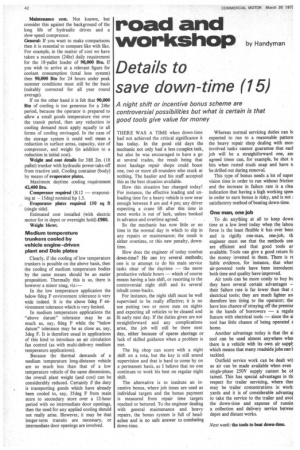road and
Page 42

If you've noticed an error in this article please click here to report it so we can fix it.
workshop by Handyman
Details to save down-time (15)
A night shift or incentive bonus scheme are controversial possibilities but what is certain is that good tools give value for money
THERE WAS A TIME when down-time had not achieved the critical significance it has today. In the good old days the mechanic not only had a less complex task, but also he was encouraged to have a go at several trades, the result being that most haulage repair shops could boast one, two or more all-rounders who stuck at nothing. The haulier and his staff accepted this as the best situation available.
How this situation has changed today! For instance, the effective loading and unloading time for a heavy vehicle is now near enough between 8 am and 4 pm; any driver expecting a crane lift after this time in most works is out of luck, unless booked in advance and overtime agreed.
So the mechanic has now little or no time in the normal day in which to slip in any repairs or maintenance; the result is either overtime, or this new penalty, downtime.
How does the engineer of today combat down-time? He can try several methods; one is to attempt to do his main service tasks clear of the daytime — the more productive vehicle hours — which of course means having a late shift, or resorting to the controversial night shift and its several inbuilt come-backs.
For instance, the night shift must be well supervised to be really effective; it is no use putting two or more men on nights and expecting all vehicles to be cleared and fit early next day. If the duties given are not straightforward and any complications arise, the job will still be there next day, either because of spares shortage or lack of skilled guidance when a problem is met.
The big shop can score with a night shift on a rota, but the key is still sound supervision and that is hard to come by on a permanent basis, as I believe that no one continues to work his best on regular night shift.
The alternative is to institute an incentive bonus, where job times are used as individual targets and the bonus payment is measured from repair time targets reached or bettered. To the engineer dealing with general maintenance and heavy repairs, the bonus system is full of headaches and is no safe answer to combating down-time.
Whereas normal servicing duties can hi expected to run to a reasonable pattern the heavy repair shop dealing with mon involved tasks cannot guarantee that eacl job will be a straightforward one, anc agreed times can, for example, be shot tc bits when rusted studS snap and have k be drilled out during removal.
This type of bonus needs a lot of super vision time in order to run without friction and the increase in failure rate is a clea indication that having a high working speed in order to earn bonus is risky, and is not satisfactory method of beating down-time.
One man, one job
To do anything at all to keep down time at a low level today when the labou force is the least flexible it has ever been and is rigidly one-man, one-job, th engineer must see that the methods use are efficient and that good tools ar available. Tools can give a good return fo the money invested in them. There is re liable evidence, for instance, that wher air-powered tools have been introduce( both time and quality have improved.
Air tools can be more costly to buy bu they have several certain advantages — their failure rate is far lower than that c electrical tools; they are much lighter an therefore less tiring to the operator; the have less chance of straying off the premise in the hands of borrowers — a regula feature with electrical tools — since the ai tool has little chance of being operated g home.
Another advantage today is that the ai tool can be used almost anywhere whei there is a vehicle with its own air suppl: which means that many roadside jobs can t tackled.
Outfield service work can be dealt wit as air can be made available when even single-phase 250V supply cannot be ot tamed. This has special advantages in thi respect for trailer servicing, where ther may he trailer concentrations in work yards and it is of considerable advantag to take the service to the trailer and avoi the down-time and expense of runnin a collection and delivery service betwee depot and distant works.
Next week: the tools to beat down-time.










































































































